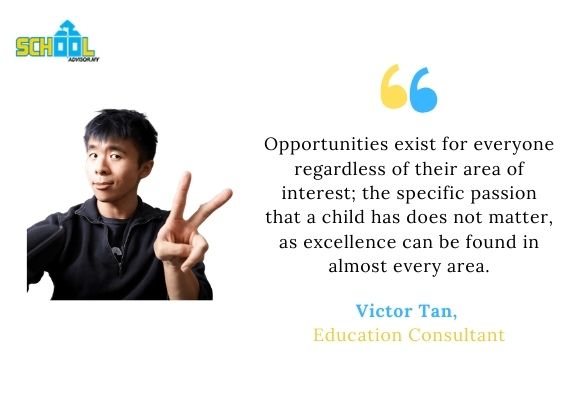How Do I Get My Child Excited About Top Universities?
Published by SchoolAdvisor | Mar 08, 2021By Victor Tan, Education Consultant
Watch Victor discuss why top universities matter now more than ever.
Many parents are concerned about their child’s prospects in the future, and for good reason. The world has become more competitive than it ever has been, and preparations to enter that world have accordingly become more difficult.
One way to help your child to obtain an edge in this process is to help them to target a top university, one with an incredible reputation for teaching, learning, and scholarship so that they can have a wonderful network of peers and great career opportunities with companies that come to recruit at these universities. Not to mention, better life prospects in general upon graduation that can translate into incredible outcomes, into a career in a dream geography and into an incredible life.
If you’re reading this article, you’ve probably already come to understand the numerous benefits of targeting a top university:
- Networking opportunities with some of the brightest minds in the world across many different industries and areas of study.
- Institutional opportunities for internships and research.
- Top quality training by some of the best leaders in the world.
Many students understand this and seek it out - and that is why I have had the privilege to assist students in getting into universities such as Yale, Cambridge, the University of Chicago, Johns Hopkins, Wharton (University of Pennsylvania), Princeton, and many other notable universities attended by some of society’s greatest visionaries.
If your child already understands these benefits and how they can leverage them by pursuing a degree at a top university, you will have no problem guiding them towards developing motivation and taking the actions that they need to obtain:
a) Top grades in the subjects that they wish to study.
b) Stellar extracurricular achievements across any area or hobby that they wish to pursue.
c) A thought process encompassing both depth and far-ranging inquiry that is steeped in a desire to learn and to grow.
d) A strong ambition for better things that is matched by a powerful work ethic.
With that in mind, here is some specific advice to prepare your child for success in later life, both as they head to university and beyond.
1. Have a conversation with your child about their desired outcomes of a university education and ensure that they are clearly aware of the benefits of receiving a good one.
Photo by KOBU Agency via Unsplash
Many children do not start thinking about university until they are at the age of 16 or 17, and do not often think in a formal way about what they are going to do a bit later or about the benefits that receiving more education will give them. Indeed, very often children are exposed only to the idea that getting good grades is desirable and getting poor grades is not.
In order to set your child in the correct direction for top university enrolment, you should create an environment in your home where your child can understand the benefits of pursuing a top university education and choose to pursue that goal on a personal level.
Try to have conversations with them starting from an early age to introduce the possibility that they attend good schools and eventually move them towards becoming conscientious and conscious about the course of their personal development.
While parental pressure and a desire for reputation may compel a child to comply and it is possible to exert that kind of pressure, I have seen from my experience with numerous students that this kind of pressure often ends up counterproductive in the long run, particularly if the child does not have the desire to pursue education or does not understand the reasons as to why education can benefit them.
After all, students who do not know the specific benefits of receiving good grades or going to a highly ranked university will not pursue these goals, and therefore will not dedicate effort or may only dedicate the bare minimum if their parents go up to them and say: ”Child, you must go to a good university!”
Go further, and consider some of the following things with your child:
a) Why might a top university (Cambridge, Yale) be better than Universiti Malaya Sabah? Is it always?
b) What kinds of people might you meet at a top university that you might not back home?
c) What specific kinds of opportunities might you have at a top university that you might not have back home?
d) What kinds of career opportunities or what kinds of markets might you have access to if you receive an education in a top university?
The clearer the picture that you can construct of the benefits that lie ahead, the easier it will be to help your child to develop the interest and desire to pursue a top university education.
From then on, your job will simply be to seek out the correct guidance and preparation to ensure that your child can achieve that goal in their mind’s eye, by seeking out:
a) Specific information on the university applications process for the university that you would like to apply to. (US uses Common App, UK uses UCAS, etc)
b) Specific information on the grades or requirements that your child needs to attain in order to attain their goals.
c) Specific guidance on how to develop your child’s career or life or extracurricular activities over the next months or even years.
That said, it is entirely possible that your child does not know what they wish to do with his or her life. With that in mind, this brings us to the next step:
2. Expose your child to new teachers and mentors.

Photo by Your Teen Magazine
Sometimes, it is entirely possible that your child simply does not know what to do because they have no clear vision or sight of the kind of person that they may want to become. With that in mind, exposing your child to new teachers or mentors can help them envision more clearly the kind of person that they wish to be, while simultaneously helping them to discern a correct path of action forward that is based on the experience of someone who has been through these things.
For example, suppose that your child has an interest in English literature but is unsure whether a bright future lies ahead and is unaware of what sort of career paths are possible, you can seek out someone for your child to talk to that has experienced the same challenges and then discover what kinds of actions that person has taken, thereby allowing them to clearly visualize what they should do in order to move forward.
By performing this action, it is possible to help your child to develop foresight, desire, and to imagine the kind of life that is possible for them to have if only they take the correct set of actions that are necessary by developing a relationship with someone who has achieved some of the goals that your child wishes to achieve.
With that said, it is not always possible to expose your child to an external mentor or such an individual may not be immediately available at hand. In any case, it is good to:
3. Develop an interest in the things that your child is interested in, and attempt to pursue an understanding of the opportunities that are associated with each of these interests.

Photo by You X Ventures on Unsplash
In the modern world, opportunities abound for people who pursue their interests, no matter what sort.
Most people are aware that magnificent opportunities exist for people to compete in tournaments that assess their knowledge of specific subjects like mathematics, informatics, physics, and chemistry. Likewise for people who compete in activities such as chess, tennis, squash, dance, debate, Model UN, and swimming, for example.
But frankly, opportunities exist for everyone regardless of their area of interest; the specific passion that a child has does not matter, as excellence can be found in almost every area, whether it is the arts, a game, a subject or computer programming. Even with something like social media; it is simply a matter of understanding excellence within a domain and encouraging your child to pursue the highest level that they can.
Therefore, in the event that your child is unsure about what they want to pursue, learn about your child’s interests, and encourage your child to pursue the widest variety of options available to them - if they are absolutely sure, then ensure that they commit to the one specific area that they would like to pursue.
Rubik’s Cube solvers can test their mettle against the world to showcase their physical and mental facility with uniting all the colors of a 3x3x3 cube with one another in the WCA world championships. Arts practitioners can sell things on Etsy or create popular social media profiles that people enjoy and follow en masse. Astronomy lovers can test their mettle by contributing to open source projects, etc.
Frankly, there is no such thing as a ‘wrong’ passion - there is only the wrong way to approach a passion, for example by declaring that it is not worthwhile, or discouraging it in lieu of another more ‘socially acceptable’ activity, which may cause a child to move towards passions that they do not excel at.
Therefore, to support your child best, try to do research on their passions and develop a good idea of what constitutes success in that area, before leading your child towards developing excellence in that area.
While it is possible that a child is not good at what they are passionate about, the idea is generally to push them forward and have them move towards a direction such that they cannot make excuses for not doing their very best to excel, to be able to say: ”If you are truly passionate about this, then why are you not pursuing what you yourself have declared is your greatest interest?”
With that in mind, passions related to one’s area of study should also be encouraged, but these need not be encouraged to the exclusion of their desired career.
I have more tips for you, but I’ll save that for Part II. I look forward to guiding your child towards excellence!
About Victor Tan:

Victor Tan is a previous JPA Ivy League dan Setara Scholar, and he studied Economics at the University of Chicago under full government sponsorship. He is the founder of Victory Education, a specialized university admissions and SAT/IB/A Levels tutoring agency that prepares students with the necessary cognitive skills and abilities that they need for success in the elite university admissions game and beyond. Learn more about how Victor can provide you with academic assistance on My Private Tutore page.


